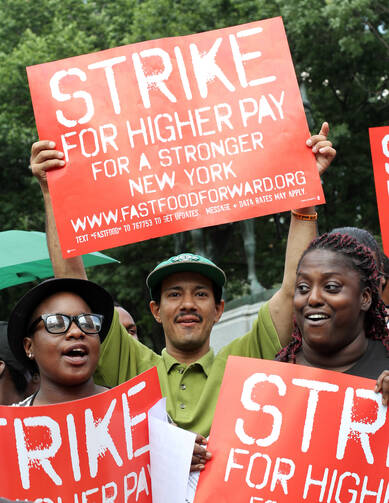When fast-food workers across the country walked off their jobs demanding higher wages on Dec. 5, their actions should have caught the attention of the nation's Catholics, say those who stress that the call for a living wage echoes long-standing Catholic social teaching.
Christine Firer Hinze, theology professor at Fordham University in New York, said "Catholics would have to be behind" the slogan frequently used in many of the recent campaigns to raise the minimum wage: "No one should work full time and be in poverty."
Hinze said today's "working poor working three jobs just trying to piece together a living wage is a violation of their right to have a family and family life," but she noted that many Catholics don't necessarily see this as a religious issue.
She said there is a pervasive argument that the government shouldn't interfere in people's lives that she countered by saying "it should interfere when it is needed to protect and uphold the dignity of people and rights of workers to have sustenance for their work."
Hinze, co-director of the Francis and Ann Curran Center for American Catholic Studies at Fordham, stressed that she was not saying anything new but merely reiterating Pope Leo XIII's 1891 encyclical "Rerum Novarum" with its call for just wages and the 1906 document "A Living Wage" by Msgr. John Ryan.
The activist priest, who died in 1945, not only wrote about the need for a minimum wage -- when none existed -- he also drafted the legislation for Minnesota's minimum wage law and served on various White House committees on labor and social security legislation.
Hinze said Msgr. Ryan emphasized that a living wage should provide more than bare subsistence but instead should be an amount to enable a person and one's family "to live in a manner worthy of a human being." She said, according to that calculation, in 1906, he calculated that a worker would need to earn $600 a year. The equivalent measure today would mean a family of four living in Toledo, Ohio, would need $55,000 a year but the minimum wage full-time salary of $7.25 an hour provides about $15,000 yearly.
The U.S. bishops' justice and peace office in 2006 wrote that "although the minimum wage is not a living wage, the Catholic bishops have supported increasing the minimum wage over the decades ... to help restore its purchasing power, not just for the goods and services one can buy but for the self-esteem and self-worth it affords the worker."
Pope Francis' Nov. 26 apostolic exhortation "Evangelii Gaudium" ("The Joy of the Gospel"), also honed in on today's economy. The pope said he rejected "trickle-down theories which assume that economic growth, encouraged by a free market, will inevitably succeed in bringing about greater justice and inclusiveness in the world."
The document's sound bite: "How can it be that it is not a news item when an elderly homeless person dies of exposure, but it is news when the stock market loses two points?" was even quoted by President Barack Obama Dec. 4 in a speech in Washington supporting the movement to raise the minimum wage.
The president, who has expressed support for a Democratic proposal to raise the minimum wage to $10.10 per hour, pointed out that the noted that the American economy had doubled in size since 1979, but most of that growth has been restricted to a "fortunate few."
He also stressed that fast-food workers and retail workers "work their tails off and are still living at or barely above poverty."
The momentum to increase the minimum wage -- at the federal and state level -- has the support of 76 percent of Americans, according to a Gallup poll released Nov. 11.
Seventy-five years ago, President Franklin D. Roosevelt signed into law a national minimum wage. Today, the current federal minimum wage is $7.25 an hour; had the minimum wage kept pace with inflation it would be at $10.74 per hour. Additionally, minimum wage for tipped workers hasn't been raised in more than 20 years and remains at $2.13 an hour.
This year, according to the National Conference of State Legislatures, 18 states and the District of Columbia have minimum wages that are higher than the federal minimum wage, while 23 states have minimum wages equal to the federal minimum wage, and four states have minimum wages below the federal minimum wage. Five states have not established a state minimum wage.
While some economists and businesses argue that increasing minimum wages could lead to closings or fewer available jobs, Robert Bruno, professor of Labor and Employment Relations at the University of Illinois in Chicago, disagrees.
He said there is no conclusive data that shows increased wages would harm employers or employees.
Raising the minimum wage is a "win-win," he said. He said it used to have bipartisan support but now seems to be "a symbol of the divide between corporate America and working America, when it is really a sign of dysfunctional political process."
When you simply look at it by values and social good, he said, "there is no argument not to increase the minimum wage."








